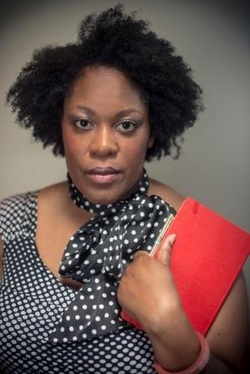Artistic Statement

Photo by Jason Hornick.
In an interview, I was asked what kind of theater excites me. In response, I wrote the following:
“Theater that is magic. That provokes and pushes boundaries. That poses difficult questions. That reflects the human condition. That shows us how awful and beautiful we can be to one another ...and that we have a choice in how we behave. That uses powerful and provocative language. That introduces us to interesting and compelling characters. That is intimate, funny, honest, scary, ugly, messy, poetic, and beautiful. Theater, that while ephemeral, remains with you forever.”
This is the kind of theater that I strive to create. I love writing. I love telling stories. I keep a journal and pen with me all the times, because a piece of dialogue, a monologue, or a stage direction will come to me at any given moment. I find creative inspiration in living and in trying to answer big questions about life and the events happening around me. I’m inspired to write about history, paintings, heartbreak, hope, memory, negligence, and injustice, as it relates socially, politically, and historically to who I am.
While my personal life experience doesn’t limit the content and scope of my work, it certainly serves as a catalyst for inspiration. I’ve written about self-hatred within the Black community (BLOOD-BOUND AND TONGUE-TIED); the 2006 Lebanese war and the controversial CIA interrogation tactics (THE DEVIL’S SWEET WATER); the Booth family and their British American theatrical roots (MAD BREED); the impact of gentrification on inner city youth (LOVE BROTHERS SERENADE); and the ever-changing role of women in society, the damaging impact of PTSD on military veterans and their families (NOMS DE GUERRE), the impact of the #MeToo Movement on the hotel industry (BLACKBIRDS), the impact of climate change on historically black community (FREEDOM HILL), and (THE INFERIOR SEX).
In theatre, we are able to explore the powerful, strange, terrifying, curious, and beautiful human experience. After 9/11 and in the two years leading up to the war in Iraq, I began to write with a deeper sense of civic duty and an increasing interest in the unfolding narrative of the United States. With a play, I am able to lay out all sides of the story, hear all of the voices, and portray a myriad of responses to the varied situations people face in life. In doing so, I am able to make sense of the world in order to find it livable again. What’s more, I am committed to social justice. I think about it in terms of absence and omission. What stories aren’t being told? Whose voices aren’t being honored or shared? Who isn’t invited to the table? Who isn’t even in the room? This is why I'm so grateful to the theater and feel blessed to be a playwright.
“Theater that is magic. That provokes and pushes boundaries. That poses difficult questions. That reflects the human condition. That shows us how awful and beautiful we can be to one another ...and that we have a choice in how we behave. That uses powerful and provocative language. That introduces us to interesting and compelling characters. That is intimate, funny, honest, scary, ugly, messy, poetic, and beautiful. Theater, that while ephemeral, remains with you forever.”
This is the kind of theater that I strive to create. I love writing. I love telling stories. I keep a journal and pen with me all the times, because a piece of dialogue, a monologue, or a stage direction will come to me at any given moment. I find creative inspiration in living and in trying to answer big questions about life and the events happening around me. I’m inspired to write about history, paintings, heartbreak, hope, memory, negligence, and injustice, as it relates socially, politically, and historically to who I am.
While my personal life experience doesn’t limit the content and scope of my work, it certainly serves as a catalyst for inspiration. I’ve written about self-hatred within the Black community (BLOOD-BOUND AND TONGUE-TIED); the 2006 Lebanese war and the controversial CIA interrogation tactics (THE DEVIL’S SWEET WATER); the Booth family and their British American theatrical roots (MAD BREED); the impact of gentrification on inner city youth (LOVE BROTHERS SERENADE); and the ever-changing role of women in society, the damaging impact of PTSD on military veterans and their families (NOMS DE GUERRE), the impact of the #MeToo Movement on the hotel industry (BLACKBIRDS), the impact of climate change on historically black community (FREEDOM HILL), and (THE INFERIOR SEX).
In theatre, we are able to explore the powerful, strange, terrifying, curious, and beautiful human experience. After 9/11 and in the two years leading up to the war in Iraq, I began to write with a deeper sense of civic duty and an increasing interest in the unfolding narrative of the United States. With a play, I am able to lay out all sides of the story, hear all of the voices, and portray a myriad of responses to the varied situations people face in life. In doing so, I am able to make sense of the world in order to find it livable again. What’s more, I am committed to social justice. I think about it in terms of absence and omission. What stories aren’t being told? Whose voices aren’t being honored or shared? Who isn’t invited to the table? Who isn’t even in the room? This is why I'm so grateful to the theater and feel blessed to be a playwright.